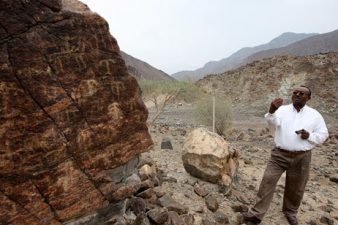 By calling the Middle East water problem an apocalypse, AFED Secretary General attempts to draw attention to the real and immediate danger shortages represent.
By calling the Middle East water problem an apocalypse, AFED Secretary General attempts to draw attention to the real and immediate danger shortages represent.
While bureaucrats push paper in their plush offices, the citizens they represent face what one senior researcher calls a water apocalypse. Yemen’s aquifers could dry up as early as 2012, thereby exacerbating the security problems there, and the United Arab Emirates would already be a wasteland if it weren’t for the many desalination plants that keep it afloat.
And yet government allows for investors to pad their pockets with profligate building schemes that will usurp even more water resources, essentially robbing the poorer population of their share. At last week’s Arab Forum for Environment and Development (AFED) in Beirut, 500 delegates from 52 countries sounded a collective call to establish better regulation, better efficiency, and to embrace technology that can deliver more freshwater resources.
Unfortunately, many of the issues sited as cause for the Middle East’s water problems (apart from the fact that water has never been the ME’s trump card) are the same indicators that real change will happen quickly enough to avert disaster.
In Depth News sites political and management shortcomings, fragmented water institutes, insufficient water legal systems, constrained public water budgets, and water policies that are not informed by science as contributing factors.
Dr. Farouk El-Baz, an Egyptian-American scientist who worked with a NASA exploration of the moon, recommended that satellite images may reveal further groundwater resources that would help to alleviate what everyone agrees is a “critical” situation that “demands immediate attention.”
How critical is critical? According to IDN, by 2015 some countries’ per capita freshwater resource will dip below 500 cubic meters, and as low as 100 cubic in some places. The international average is 6500 cubic meters and anything below 500 is considered dangerously low.
Let’s put that in perspective: 100 cubic meters is equivalent to approximately 72 gallons a day per person. Flushing a toilet requires approximately three gallons and a ten minute shower could use up to 42 gallons. On average, people use one gallon to wash their hands and brush their teeth, five gallons to wash a sink full of dishes, and ten to hand-wash a load of clothing.
If in one day a person takes one shower, flushes a toilet three times and washes their hands afterward, and if they brush their teeth twice, wash two loads of dishes and one of clothing, then they will already have used up their daily quota. That doesn’t take into account the amount of water required for drinking, or for industrial agriculture and energy production, which in America amounts to 1,430 gallons per person per day.
To say that 100 cubic meters of water is insufficient to sustain life would be a gross understatement. But how do we prevent our populace from having to endure such hydrological poverty? Some of the solutions proposed at AFED include making existing water systems more efficient, improving agriculture (“more crop per drop”) and embracing better technology such as desalination. But since government is notoriously slow to unfold, a grassroots initiative would also go a long way to reducing the water burden.
Take shorter showers, turn off the tap while brushing teeth, use water efficient appliances, don’t even think about having a lawn or swimming pool – which are both heinously water intensive. Wash your cars less or consider using waterless car washes such as this one in Dubai. And then, treat the water resources we do have, (including rivers, etc.) as though they were your last drop.
:: IDN
More water news from the Middle East:




Comments are closed.